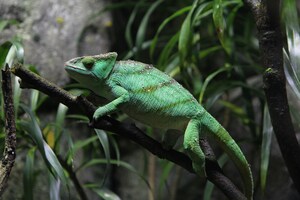How to take care of reptiles in winter
Posted By Jacob Philips
Body
Taking care of reptiles during the winter months requires special attention to ensure their health and well-being in potentially challenging conditions. As temperatures drop and daylight hours shorten, reptiles may experience changes in behavior, metabolism, and overall health. Proper winter care involves adjustments in housing, temperature regulation, diet, and hydration, as well as considerations for handling, enrichment, and emergency preparedness. By following expert guidelines and understanding the unique needs of reptiles during the colder season, reptile owners can provide a safe and comfortable environment for their beloved pets.
1. Winter Housing and Enclosure Setup
Choosing the Right Enclosure
When it comes to winter housing for your reptile pals, think cozy yet spacious. A well-ventilated glass terrarium or enclosure made of PVC or wood with secure lids are great options. Avoid drafts and keep it snug like a warm hug.
Insulation and Heating Elements
Insulation is key to keep your cold-blooded buddies toasty. Beds of substrate like aspen shavings or cypress mulch can help retain heat. Pair this with a quality heating pad or ceramic heat emitter for that perfect lizard spa experience.
2. Temperature and Lighting Requirements
Optimal Temperature Ranges
In winter, reptiles crave warmth like we crave a hot cup of cocoa. Provide a gradient of temperatures in their enclosure, with cozy basking spots reaching optimal levels based on their species. A chilly reptile is an unhappy reptile.
Importance of UVB Lighting
Don't let winter dim their shine! UVB lighting is crucial for your scaly buddies to absorb calcium and stay healthy. Invest in a quality UVB bulb and make sure they get their daily dose of "sunshine" even when it's gloomy outside.
3. Diet and Feeding Adjustments
Caloric Needs in Winter
Winter is like hibernation season for some reptiles, so adjust their diet accordingly. Offer nutrient-rich foods and consider reducing feeding frequency to match their lower activity levels. Think of it as their winter spa diet plan.
Supplements and Nutritional Support
It's supplement time! Dust those crickets or veggies with calcium and vitamin powders to ensure they get all the essential nutrients they need. Winter blues are no match for a well-fed reptile!
4. Humidity Control and Hydration
Maintaining Proper Humidity Levels
Say goodbye to dry skin! Monitor and regulate humidity levels in their enclosure to keep their skin hydrated and healthy. Hide boxes with damp moss can also be a cozy retreat for your reptilian buddies.
Hydration Strategies for Winter
Keep the hydration train rolling! Provide fresh water daily and consider adding a humidifier near their enclosure to combat dry winter air. A hydrated reptile is a happy reptile, ready to slither through the winter wonderland.
5. Handling and Exercise Considerations
Reduced Activity Levels in Winter
In the winter, reptiles tend to have reduced activity levels due to the drop in temperature. It's important to adjust their exercise routines accordingly and provide opportunities for them to bask in heat sources to maintain their health.
Safe Handling Practices in Cold Weather
When handling reptiles in cold weather, be mindful of sudden temperature changes that can shock or stress them. Always ensure your hands are warm before handling them and avoid exposing them to drafts or cold surfaces.
6. Health Monitoring and Preventative Care
Signs of Winter Health Issues
Keep an eye out for signs of respiratory infections, decreased appetite, or lethargy during winter, as reptiles are more susceptible to health issues in colder temperatures. Promptly consult a reptile veterinarian if you notice any concerning symptoms.
Preventative Veterinary Check-ups
Schedule regular check-ups with a reptile veterinarian, especially before the winter season, to ensure your pet is in good health and discuss any preventative measures that can be taken to support their well-being during the colder months.
7. Behavioral Changes and Enrichment
Coping with Seasonal Changes
Reptiles may exhibit behavioral changes in response to seasonal variations. Providing a stable environment with proper heat and light sources can help mitigate stress and support their natural behaviors.
Enrichment Activities for Winter
Introduce enrichment activities such as hiding spots, climbing structures, or interactive feeding methods to keep your reptile mentally stimulated during the winter months when outdoor adventures may be limited.
8. Emergency Preparedness and Winter Care Tips
Creating a Winter Care Emergency Plan
Prepare an emergency plan that includes alternative heating sources, evacuation procedures, and contact information for reptile-savvy veterinarians in case of inclement weather or power outages during winter.
Tips for Handling Power Outages or Extreme Cold Snaps
Have backup heating sources like heat pads or hot water bottles ready in case of power outages, and insulate your reptile's enclosure to retain heat during extreme cold snaps. Monitor their temperature closely to prevent any cold-related health issues.In conclusion, by implementing the recommended strategies for winter care outlined in this article, reptile owners can support their pets through the seasonal challenges and help them thrive even in colder weather. With proper attention to housing, nutrition, health monitoring, and emergency planning, reptiles can stay healthy and happy throughout the winter months. Remember, the well-being of your reptile companion is a year-round commitment, and by staying informed and proactive, you can ensure a positive winter experience for both you and your scaly friend.











Comments